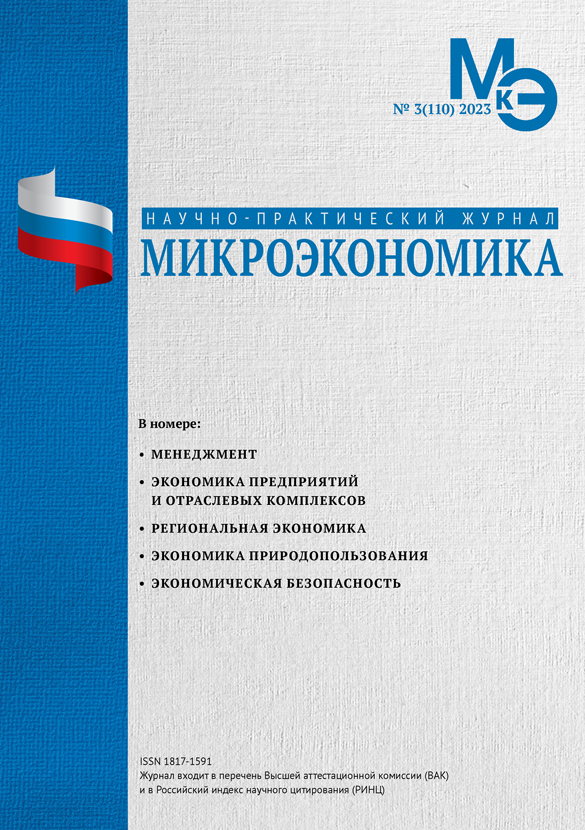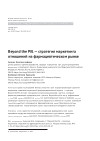Beyond the Pill – relationship marketing strategy in the pharmaceutical market
DOI: 10.33917/mic-5.112.2023.39-47
The purpose of the study was to describe one of the forms of implementation of the relationship marketing strategy characteristic of the pharmaceutical industry – the Beyond the Pill strategy. The article describes the history of the strategy, the main forms of its implementation, defines the role of the Beyond the pill strategy in the era of digitalization and the transition of healthcare to a value-oriented approach, and provides an example of the implementation of the strategy in the Russian market. The features and conditions of the implementation of the relationship marketing strategy in the pharmaceutical market are highlighted. A system of balanced indicators is proposed to assess the effectiveness of the implementation of the strategy.
References:
1. Fleck Leonardm. Controlling Healthcare Costs: Just Cost Effectiveness or «Just» Cost Effectiveness? Cambridge Quarterly of Healthcare Ethics. Cambridge University Press. 2018;27(2):271–83.
2. OECD (2023), Health spending (indicator). URL: https://www.oecd.org/els/health-systems/health-data.htm doi: 10.1787/8643de7e-en
3. Kovacs R., Powell-Jackson T, Kristensen S., Singh N, Borghi J. How are pay-for-performance schemes in healthcare designed in low- and middle-income countries? Typology and systematic literature review. BMC Health Serv Res. 2020:7;20(1):291. doi: 10.1186/s12913-020-05075-y
4. Ananthakrishnan A., Luz A.C.G., KC S. et al. How can health technology assessment support our response to public health emergencies? Health Res Policy Sys. 2022;20:124 (2022). https://doi.org/10.1186/s12961-022-00925-z
5. Wenzel, Meike & Henne, Nathalie & Zollner, Y. Beyond the pill: The move towards value-added services in the pharmaceutical industry. Journal of Medical Marketing: Device, Diagnostic and Pharmaceutical Marketing. 2014;14: 91-98.
6. Porter ME, Teisberg EO. Redefining Health Care: Creating Value-Based Competition on Results. Harvard Business School Press, 2006.
7. Marsh K., Caro J., Hamed A., Zaiser E. Amplifying Each Patient’s Voice: A Systematic Review of Multi-criteria Decision Analyses Involving Patients. Appl Health Econ Health Policy. 2017;15(2):155-162. doi: 10.1007/s40258-016-0299-1. PMID: 27928659.
8. Khurana, Atul & Rastogi, Rahul & Gamperl, Hans-Joachim. Patient Support Program in Pharmacovigilance: Foster Patient Confidence and Compliance. International Journal of Medical, Health, Biomedical, Bioengineering and Pharmaceutical Engineering. 2017;11:148-151.
9. Krishnamoorthy R. Environmental, social, and governance (ESG) investing: Doing good to do well. Open J Soc Sci. 2021;9:189–97.
10. Marcus A. Koch. Pharmaceutical Market Access: current state of affairs and key challenges – results of the Market Access Launch Excellence Inventory (MALEI). Journal of Market Access & Health Policy. 2015;3:C. 1-10. DOI: 10.3402/jmahp.v3.29679
11. Ersoy Yusuf & Tehci Ali. Relationship marketing orientation in healthcare organisations with the AHP method: Internal and external customer perspective, 2023.
12. Shillington, Alicia & Ganjuli, Arijit & Clewell, Jerry. The impact of patient support programs on adherence, clinical, humanistic, and economic patient outcomes: A targeted systematic review. Patient Preference and Adherence, 2016.
13. Brixner, D.I., Rubin, D.T., Mease, P.J., Mittal, M., Liu, H.H., Davis, M., Ganguli, A.X., & Fendrick, A.M. Patient Support Program Increased Medication Adherence with Lower Total Health Care Costs Despite Increased Drug Spending. Journal of managed care & specialty pharmacy. 2019;25(7):770-779.
14. Landwehr Konstantin. Digital Transformation in the Pharmaceutical Industry – From Products to Services «Beyond the Pill», 2015.



